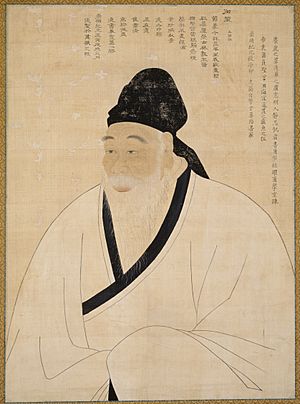Song Si-yeol facts for kids
Quick facts for kids
Song Si-yeol
송시열 |
|
|---|---|
 |
|
| Left State Councillor | |
| In office 16 July 1673 – 13 September 1673 |
|
| Preceded by | Yi Gyeong-eok |
| Succeeded by | Jeong Ji-hwa |
| In office 11 June 1672 – 29 November 1672 |
|
| Preceded by | Jeong Chi-hwa |
| Succeeded by | Kim Su-hang |
| Right State Councillor | |
| In office 19 June 1671 – 11 June 1672 |
|
| Preceded by | Hong Jong-bo |
| Succeeded by | Kim Su-hang |
| In office 5 April 1668 – 4 January 1669 |
|
| Preceded by | Jeong Chi-hwa |
| Succeeded by | Hong Jong-bo |
| Personal details | |
| Born | 30 December 1607 Guryong Villag, Yinae-myeon, Okcheon-gun, Chungcheong-do, Kingdom of Joseon (nowadays is Guryong-ri, Yiwon-myeon, Okcheon-gun, Chungcheongbuk-do, South Korea) |
| Died | 19 July 1689 (aged 81) Gaekji, Taein-hyeon, Jeolla-do, Kingdom of Joseon |
| Cause of death | Sentenced to death during custody (executed) |
| Political party | Seo-in, later No-ron |
| Spouses | Lady, of the Hansan Yi clan |
| Children |
|
| Parents |
|
| Education | Saengwon-si in 1633 |
| Korean name | |
| Hangul | |
| Hanja | |
| Revised Romanization | Song Siyeol |
| McCune–Reischauer | Song Siyŏl |
| Art name | |
| Hangul | |
| Hanja | |
| Revised Romanization | Uam, Ujae, Gyosannobu, Namgannosu, Hwayangdongju |
| McCune–Reischauer | Uam, Ujae, Kyosannobu, Namgannosu, Hwayangdongju |
| Courtesy name | |
| Hangul | |
| Hanja | |
| Revised Romanization | Yeongbo, Seongroe, Seongrae |
| McCune–Reischauer | Yŏngbo, Sŏngrae, Sŏngroe |
| Posthumous name | |
| Hangul | |
| Hanja | |
| Revised Romanization | Munjeong |
| McCune–Reischauer | Munjŏng |
Song Si-yeol (Korean: 송시열; Hanja: 宋時烈; 30 December 1607 - 19 July 1689) was an important Korean philosopher and politician. He was also known by his pen names Uam (우암) and Ujae (우재). People often called him Master Song (Korean: 송자; Hanja: 宋子; RR: Songja).
Song Si-yeol was born in Okcheon, which is in North Chungcheong, Korea. He cared a lot about the everyday problems of ordinary people. He worked for the government for over 50 years. His name appears more than 3,000 times in the Annals of Joseon Dynasty. This means he was mentioned more than anyone else! He faced serious trouble with the king because of a strong letter he wrote.
There is a special monument in his hometown to remember him. He was also a skilled calligrapher. He wrote an important message for Admiral Yi Sun-sin, a famous Korean hero. This message is kept at the Chungnyeolsa Shrine. Song Si-yeol belonged to the Eunjin Song clan.
Contents
Song Si-yeol's Family Life
Song Si-yeol came from the Eunjin Song clan. His family was an important part of his life.
His Parents
- His grandfather was Song Eung-gi.
- His grandmother was Lady Lee.
- His father was Song Gab-jo (1573 - 1628).
- His mother was Lady Gwak of the Seonsan Gwak clan (? - 1655).
His Wife and Children
Song Si-yeol was married to Lady Yi of the Hansan Yi clan (? - 1677). They had several children:
- Three sons: Song Sun, Song Hoe, and Song Seok.
- Two daughters.
- An adopted son named Song Gi-tae (1629 - 1711).
Who Was Song Si-yeol?
Song Si-yeol was a very influential person during the Joseon period in Korea. He was known for his deep thoughts and his role in politics.
A Great Thinker
Song Si-yeol was a philosopher. This means he was someone who thought deeply about life, knowledge, and how society should work. He followed a way of thinking called Confucianism, which was very important in Korea at that time. He believed in strong moral values and good governance.
His Role in Government
Song Si-yeol was also a politician. He held high positions in the government, including "Left State Councillor" and "Right State Councillor." These were like being a very senior minister or advisor to the king. He worked hard to guide the country and solve problems. His long career shows how important he was in Joseon politics.
His Legacy
Song Si-yeol left a lasting impact on Korean history. He was a respected scholar and teacher. Many people followed his ideas and learned from him. Even though he faced difficulties at the end of his life, his contributions to philosophy and government are still remembered today.
See Also
|
|
 | William L. Dawson |
 | W. E. B. Du Bois |
 | Harry Belafonte |

